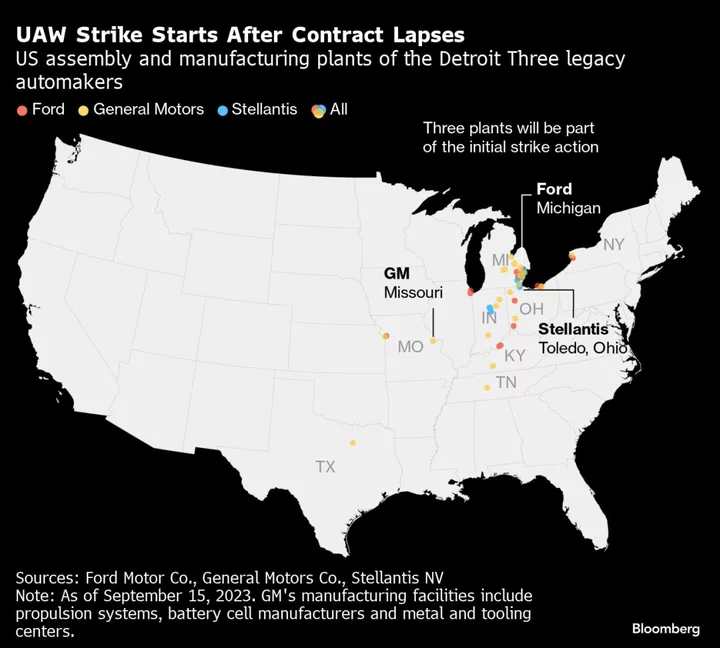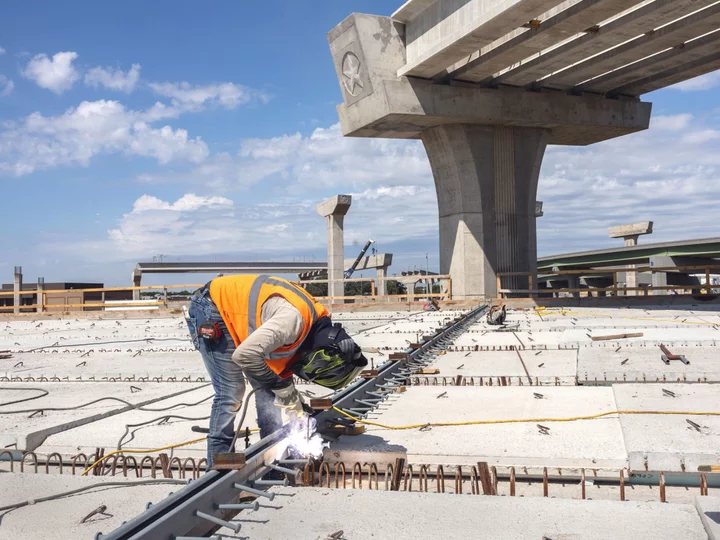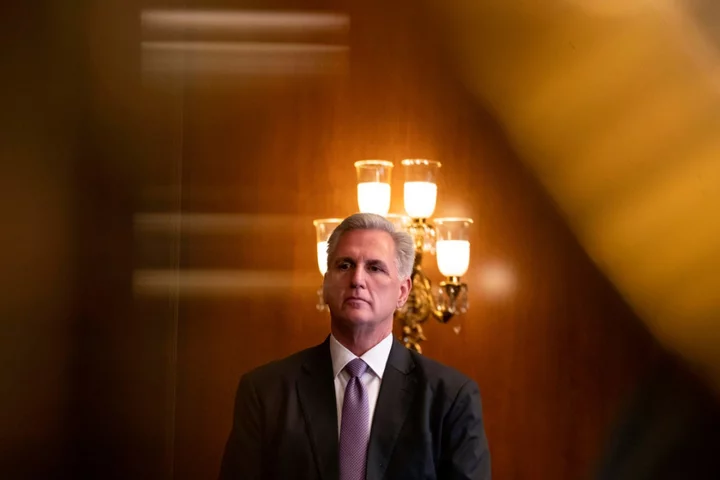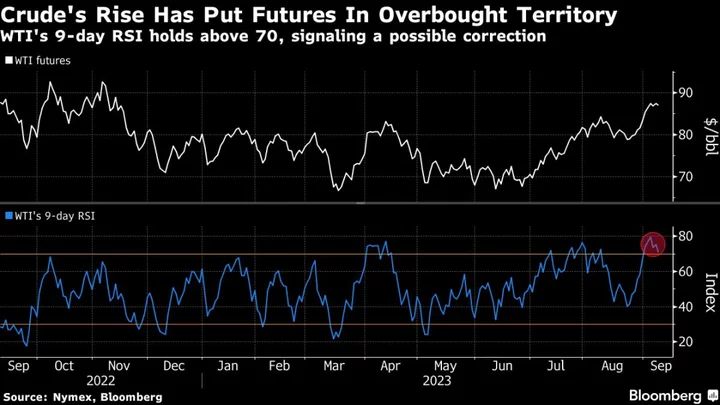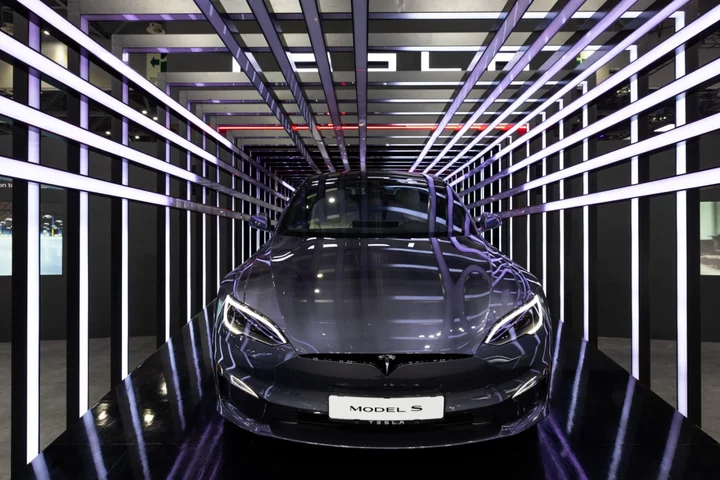The United Auto Workers and Detroit automaker executives exchanged harsh words on Friday, the first day of the union’s unprecedented simultaneous strike against all three of Detroit’s manufacturers.
After the midnight deadline for a new contract passed, workers walked out of a Ford Motor Co. plant in Michigan, a General Motors Co. factory in Missouri and a Stellantis NV plant in Ohio. Picket lines began in the early hours Friday, and a war of words followed.
In a statement Friday afternoon, Union President Shawn Fain said that for six weeks, the carmakers “chose not to get down to business.”
“Today we’re rallying with our members. Tomorrow, we expect to be at the bargaining table,” he said. “We’ll keep fighting for justice for the working class while the Big Three keep price-gouging the American consumer, ripping off the American taxpayer, and shortchanging the American worker.”
Earlier, GM Chief Executive Officer Mary Barra told Bloomberg TV that she was “extremely disappointed and frustrated.” Her company’s offer of 20% raises over four years, cost-of-living allowances and increases for existing pensioners, she said, was the best in its 115-year history.
“This is a strike that didn’t need to happen,” she said.
Barra gave a series of television interviews Friday morning to make the case that she thought the strike could be over “very quickly.” After one appearance, the UAW posted on social media network X that “during the eight and a half minutes @GM CEO Mary Barra appeared on CNN this morning, she ‘earned’ more money than any autoworker makes in a full work day.”
The Business Roundtable, which Barra chairs, sent a statement saying the UAW strike “will be felt by workers, businesses and communities beyond the auto industry,” and concluded by urging a resolution “before the consequences cause broader economic harm.” Anderson Economic Group, based in Michigan, has estimated that a 10-day strike could cost the US $5.6 billion.
In an internal memo sent Friday, GM warned workers at a plant in Fairfax, Kansas, the facility may be idled as early as next week due to the strike. The Fairfax plant receives parts from the Missouri GM facility included in the initial UAW walkout.
Read More: What’s at Stake as US Auto Workers Go on Strike: QuickTake
Ford CEO Jim Farley told CNBC Thursday that unless his final assembly plants got the parts they needed, Ford would need to lay off workers “within hours or days.” On Friday, the company did just that, laying off 600 workers from the Michigan plant that UAW members were picketing, CNBC reported.
In remarks at the White House, President Joe Biden said that he had been in touch with the union and automakers, and that “the companies have made some significant offers.”
“But I believe they should go further to ensure record corporate profits mean record contracts for the UAW,” he said.
Ohio Democratic Senator Sherrod Brown, who faces a tough reelection fight next year, visited the picket line at the Stellantis Jeep plant in Toledo Friday morning.
“UAW workers made sacrifices to save the American auto industry,” he said in a statement. “Now the Big 3 are making record profits – all workers are asking for is their fair share.”
Republican Senator Josh Hawley of Missouri used the walkout to bash Biden’s push for more electric vehicle production while backing the workers’ demands for a raise.
“Auto workers deserve a raise - and they deserve to have their jobs protected from Joe Biden’s stupid climate mandates that are destroying the US auto industry and making China rich,” Hawley posted on X.
Outside Ford’s assembly plant near Detroit, the large crowds of protesters cheering at passing cars included Denise Bonner and her husband. She said the strike was perhaps their last chance to get a pension before retirement.
“I’m pushing 60 now, so it’s really, it’s not easy work when you’re my age,” she said. “It’s hard to walk out, literally.”
Groups of strikers were stationed at every entrance and exit to block truck deliveries to the plant, which makes some of Ford’s most lucrative models, including the Bronco. Ford security people, with little to do, stood outside checkpoint huts and watched the demonstrations unfold.
While most of the workers said they supported the union’s approach, some were nervous about making ends meet on the strike of about $500 a week.
“I’m a little worried,” said Diana Osborne, a line worker for 12 years. “But we’re going to make it work.”
--With assistance from Jordan Fabian, Jenny Leonard and Keith Naughton.
(Updates with details on idled plants, layoffs in paragraphs nine and ten.)
Author: Steven T. Dennis and Ian Kullgren

